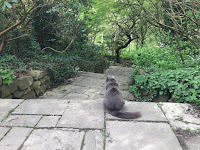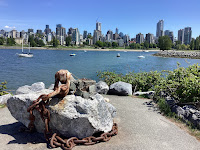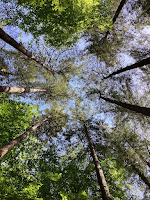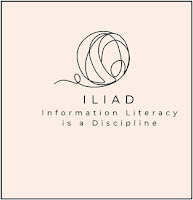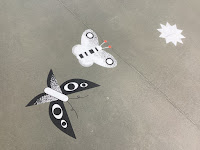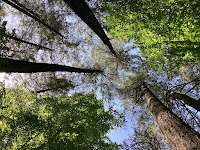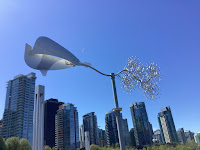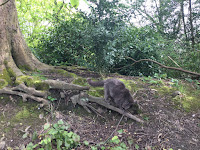
A session that I didn't blog for the WILU (information literacy) Conference (that took place last week in Vancouver, Canada) was a workshop: Lurking, reflecting, modeling, listening: Critiquing the role of active learning in library instruction. It was run by Heather Campbell (Curriculum Librarian, Western University, Canada) and Ashley Edwards (Indigenous Initiatives and Instruction Librarian, Simon Fraser University, Canada). Also involved in creating the workshop was Karen Nicholson (Manager, Information Literacy, University of Guelph, Canada). I didn't liveblog, as that seems a bit intrusive in workshops, but I took notes from the first half, which was a presentation. Apologies for omissions or misinterpretations.
The session had been stimulated by: Hicks, A; Sinkinson, C; (2021) Participation and Presence: Interrogating Active Learning. portal: Libraries and the Academy , 21(4), 749-771. (open access copy here) and the workshop aimed to "highlight challenges that active learning, as a hegemonic practice, poses from the perspective of power, agency, and inclusion."
After a territorial acknowledgment, one of the starting points for the session was a reference to Cree Metis teaching of humility; meaning not to think of yourself as better than anyone else; a reflection of non hierarchy (this book was cited). They introduced Hicks & Sinkinson's (2021) critique of active learning, noting that active learning may be framed as a "best" teaching practice, but that (for example) it may devalue self protective information behaviour; that it can make learning performative (you have to see the active learning happening); that it may ignore inequalities. I will note that there was discussion about whether this was the only way to interpret "active learning", since definitions often focus on student-centredness and students constructing their own learning. One of the contextual factors was that (if I understood correctly) in Canada there is a 3 day course on teaching for staff engaged in university teaching [so a lot less than the PG Cert academics are expected to take in the UK], which positions active learning as a desirable teaching approach.
The workshop encouraged us to critique active learning through 5 lenses. 3 of these were ones we addressed in the second, workshop, half of the session: Universal Design for Learning, Critical pedagogy and Decolonisation. The other two were explained in the introduction.
Firstly: Epistemic justice. This was defined as “Equal capacity of all knowers and equal treatment of diverse knowledge systems”. Thus you do not privilege one knowledge system over another and you avoid cognitive imperialism. Beth Patin and Sofia Leung were mentioned. Taking an epistemic justice approach surfaces questions such as: what is active learning;? who defined it and why? who is knowledgeable about active learning?
In terms of definitions of active learning, these can be negative e.g. identifying that is not passive learning, not lecturing (rather than saying what it is).
Reflecting on who originated active learning, they traced it back to the Enlightenment, with scholars pressing back against the power of church and monarchy. A second date was Canada in the 1930s, including national curricula reform and political desire for a "national childhood". This had practical/economic goals such as educating the workforce. Then in the 1960s scientists were mapping the brain, seeing the brain lighting up during active learning activities, and assuming that this meant that learning was taking place. In the classroom, active learning tends to be associated with activities such as: discussion, group work, minute papers, discovery learning, pair-share. Definitions of "active learning" may explicitly exclude reading, listening, observing and reflecting, even though these may be effective and preferred ways of learning for some people.
Secondly: Indigenous perspectives. It was noted that there is not one sole "Indigenous perspective": in any one region there may be multiple peoples, each with their own perspective. The speaker identified in this case First Peoples principles of learning (developed for schools (K12 in North America) but also more widely applicable. These could be used to review your teaching and learning practice. It was suggested you concentrate on a few principles at a time. The principles were:
- Learning ultimately supports the well being of self, the family the community the land the spirits and the ancestors
- Learning is holistic reflexive reflective experiential and relational (focused on connectedness on reciprocal relationships and a sense of place)
- Learning involves recognising the consequences of one’s actions
- Learning involves generational roles and responsibilities
- Learning involves patience and time
- Learning requires exploration of one’s identity
- Learning involves recognising that some knowledge is sacred and only shared with permission and or in certain situations
- Learning recognises role of indigenous knowledge
- Learning is embedded in memory history and story
The speaker also talked about indigenous storytelling, and the nine sk'ad'a principles (referencing: Davidson, S. & Davidson, R. (2018). Potlatch as Pedagogy: Learning Through Ceremony. Winnipeg: Portage & Main Press: see also this video. This book also seems relevant.) The 9 principles are:
1) Learning emerges from Strong Relationships
2) Learning emerges from Authentic Experience.
3) Learning emerges from Curiosity.
4) Learning occurs through Observations.
5) Learning occurs through Contribution.
6) Learning occurs Recognizing and Encouraging Strengths.
7) Learning honours the Power of the Mind.
8) Learning honours History and Story.
9) Learning honours Aspects of Spirituality and Protocol.
Davidson emphasises that these principles should be localised to your own cultural context.
As I've said, the second part of the workshop was us reflecting on active learning, individually and in groups, using the lens of Universal Design for Learning, Critical pedagogy or Decolonisation (we were given some resources as a starting point). My table discussed Critical pedagogy and it was interesting getting perspectives from people in different contexts, and exploring the tensions bteween the two approaches. Altogether it was a stimulating workshop.
Photo by Sheila Webber: spring trees and reflections in a glass skyscraper in downtown Vancouver, Canada, May 2024



